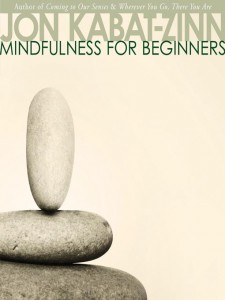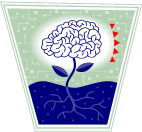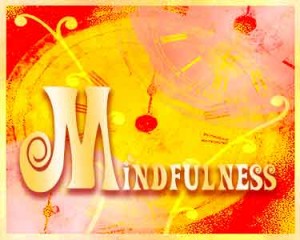Audio CDs on Mindfulness – Do They Work?
 Mindfulness techniques are designed to bring us into the present moment as fully as possible. It involves paying attention on purpose and without judgment. Mastering this type of attentional focus has proven to be a gateway for higher cognitive performance.
Mindfulness techniques are designed to bring us into the present moment as fully as possible. It involves paying attention on purpose and without judgment. Mastering this type of attentional focus has proven to be a gateway for higher cognitive performance.
Several self-instruction techniques for doing mindfulness training have been covered in other posts on the Next Brain Blog. Unfortunately, it can be difficult for beginners to use such techniques on their own. It is best to work with an experienced guide. This can be expensive and inconvenient. One alternative is to try and get such guidance off a CD. But do they really help?
To find out I bought a copy of the audio book Mindfulness for Beginners. It is a $13 two-CD set prepared by Jon Kabat-Zinn a well known leader in the field. The first CD provides an overview of the foundations of mindfulness and the second walks you through five distinct mediations or training exercises. I listened to both CD and then practiced the mediation that seemed most interesting. Although the narration style took some getting use to, the coaching and just plain reassurance was key for making progress.
One point that was particularly important (for me at least) was coaching around what to do as your mind wanders during the mediation.
Dr. Kabat-Zinn was very clear that such wandering is fine. The goal is not to stop it but to gently bring your attention back to the present. You do this by refocusing your attention on the subject of the mediation – eating a rasin in my case – over and over again. Indeed, for the beginner, bringing your attention back to focus on the mediation is the point of the exercise. Bring it back enough times and focusing becomes a habit. I experienced a bit of that! Something I was not able to do working on my own with books.
 I was attracted to the eating mediation because the exercise walks you through looking at, feeling, smelling, hearing, salivating, chewing, swallowing and otherwise sensing a raisin. May sound a bit strange but I can see many uses in my design work for such direct sensory experience. My plan is to try the other mediations and then build one into my daily mind training routine.
I was attracted to the eating mediation because the exercise walks you through looking at, feeling, smelling, hearing, salivating, chewing, swallowing and otherwise sensing a raisin. May sound a bit strange but I can see many uses in my design work for such direct sensory experience. My plan is to try the other mediations and then build one into my daily mind training routine.
I am interested to hear from readers that can recommend other CDs for mindfulness training.
Categories: Books, Mental Focus, Perception, Training Tags: Buddhist, mindfulness
Practice Mindfulness to Sharpen Mind and Perhaps Build a Bigger Brain
 Studies have shown that if you spend a lot of time juggling or playing a musical instrument the parts of your brain that supports these activities grows bigger. London taxi cab drivers that spend a decade memorizing elaborate routes experience significant brain changes. These facts support a major premise behind this blog namely, we are far more in charge of the shape, size, longevity and performance of our brain than we realize.
Studies have shown that if you spend a lot of time juggling or playing a musical instrument the parts of your brain that supports these activities grows bigger. London taxi cab drivers that spend a decade memorizing elaborate routes experience significant brain changes. These facts support a major premise behind this blog namely, we are far more in charge of the shape, size, longevity and performance of our brain than we realize.
It would stand to reason that people who meditated extensively should have bigger brains. I have found a few studies that that support this idea but there is not enough data for a firm conclusion. In one study:
“Our data suggest that meditation practice can promote cortical plasticity in adults in areas important for cognitive and emotional processing and well-being,” says Sara Lazar, leader of the study and a psychologist at Harvard Medical School. “
In a second study:
“Using MRI scans the scientists show that there was “significantly larger cerebral measurements in mediators”.
No matter, even if mediation does not grow your brain there have been studies that demonstrate improved clarity of thinking, enhance self-control, reduced stress and self-reported well being. As such it is an important option for improving cognitive performance and will be a frequent topic on the Next Brain Blog.
 Buddhist insight mediation that advocates focusing on sensation rather than our thoughts of sensation seems to produce results. It is similar to the more modern movement of mindful mediation that focuses on “being in the moment”. Finally, there is a third, non-mediative approach to mindfulness that we will explore. It is based on the contemporary work of Ellen Langer and seeks to achieve a heightened state of situational awareness of conscious control over thoughts and actions. Insight mediation, mindful mediation and cognitive mindfulness.
Buddhist insight mediation that advocates focusing on sensation rather than our thoughts of sensation seems to produce results. It is similar to the more modern movement of mindful mediation that focuses on “being in the moment”. Finally, there is a third, non-mediative approach to mindfulness that we will explore. It is based on the contemporary work of Ellen Langer and seeks to achieve a heightened state of situational awareness of conscious control over thoughts and actions. Insight mediation, mindful mediation and cognitive mindfulness.
If you are interested in giving it a try I suggestion action over reading. Try this simple five-step experiment in mindful meditation.
Source: Mindfulness Image
Categories: Ancient Ways, IQ and EQ, Manage Emotions, Mental Focus, Training Tags: Buddhist, meditation, mindfulness
